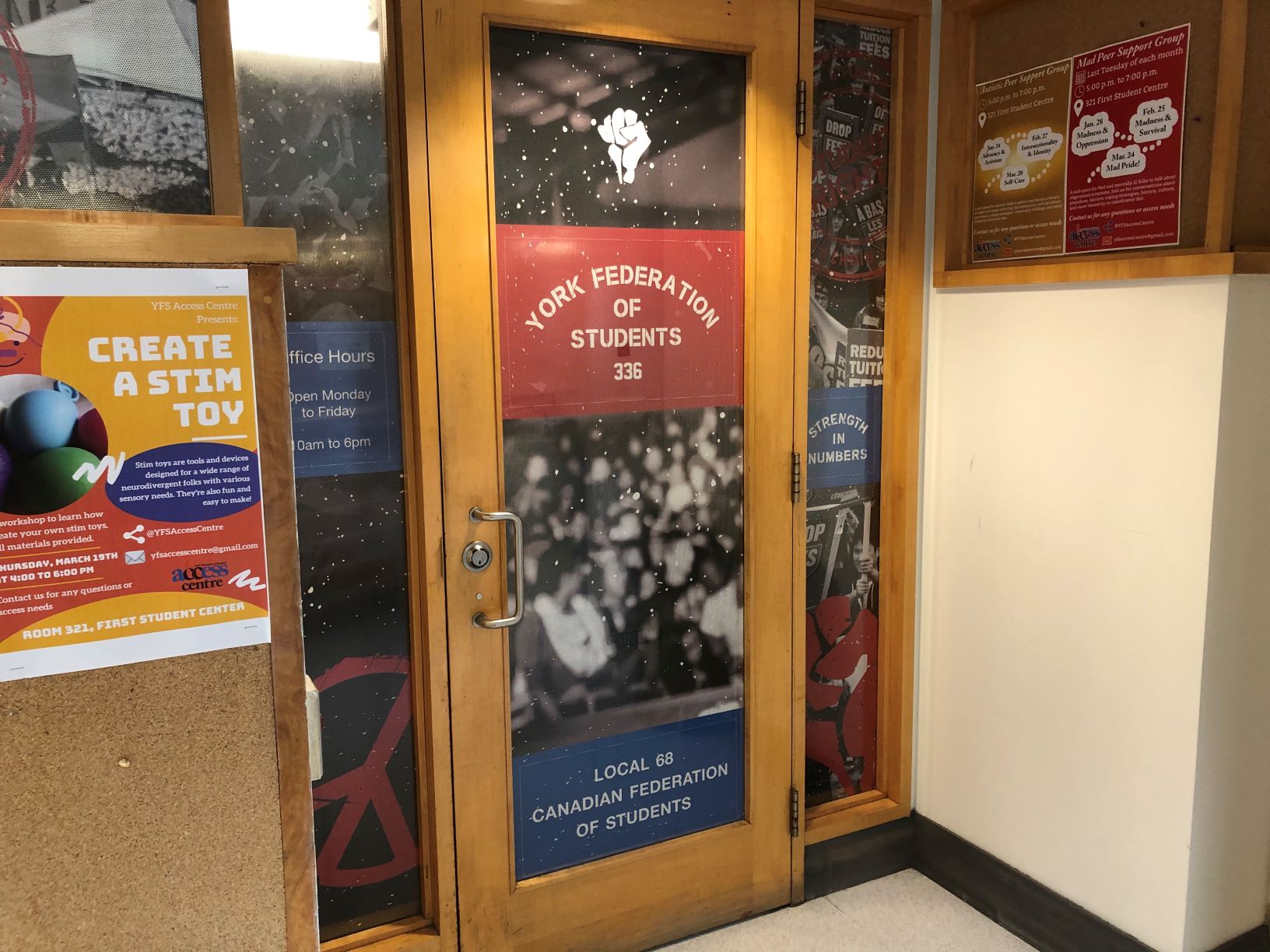Maryam Azzam | Staff Writer
Featured Image: The conclusion of the 2020-2021 YFS elections brought about widely-predicted results. | Courtesy of Jordan Chu, Photo/Video Editor
The 2020 York Federation of Students (YFS) general election results are in. Ballots have been counted and thus, the new YFS Board of Directors has been confirmed. Much like last year and the previous year, UniteYU has won the majority of positions on the Board.
The Executive Team is a collective of representatives chosen by the students to advocate for student rights and needs.
Azinwi Sanigong won the position of president with 3,792 votes over the 2,214 collected by Julia Rumberg. VP Operations was secured by Riaz Nandan who received 3,884 votes, while opposing candidate, Hamza Fazail, received a vote count of 2,141.
The role of VP Campaigns and Advocacy has gone to Jessie Whyte, who totaled 3,888 votes, over Hilly Adler’s 2,131. The position of VP Campus Life has been appointed to Jaskarn Duhra who garnered 3,855 votes, in comparison to Halena Raj’s vote count of 2,145.
All winning candidates belong to UniteYU’s party.
Every year, the YFS works towards certain goals to further create a better student experience. These main objectives include the elimination of tuition fees, public funding for public education, safeguarding students’ independent voices, protecting the right to organize, and receiving grants not loans.
However, students find that this is not always the case and that these goals are not always achieved, according to Founders College Spaces and Facilities Assistant as well as former student, Desmond Poon.
“I think they’re limited in actual power, with a lot of favouritism in the executive positions; lots of ‘Who can we get for this position?’ instead of ‘Who would be best-suited?’ Though, I think they do take this into consideration, and that this also occurs in any organization,” says Poon regarding UniteYu’s ongoing wins.
College Directors connect the student body to smaller campus communities by sitting on College Councils. Bethune College’s new director is Meryl Pirasol who received 763 votes while opposing candidate Jaz Mani received 583.
Maria Verquele-Marquez won the position of Director of Calumet College, amounting 559 votes over the 318 received by Kanisha Bardhan. Glendon College’s director position was an incredibly close call, with the position being taken by Widad Kaddura who amounted 166 votes, only two more votes than Adela Cupi.
Sarah (Bidemi) Olufemi received 392 votes, making her McLaughlin College’s director over Bhavya Bhatt, who received 195 votes. Vanier College’s director position was won by a landslide, with Waleed Al-Shurufa generating 552 votes over Kanza Pirzada who received 262.
Sarah Ayoub of Winters College received 275 votes making her the new director, while opposing candidate, Kendra Jaffray, amounted 75 votes. Again, all appointed candidates belong to UniteYU.
“I’d like to see less reliance on the College Directors doing the tasks that the execs refuse to do,” says Poon reflecting on his past experience with the YFS. “Also, better communication between the College Directors and the executives because oftentimes, the college reps have no idea what the YFS is doing.”
Despite aiming to create a better student experience for the York masses, it appears many students either don’t see a difference being made or they simply don’t care.
Fourth-year cinema and media studies student, Julia Botter, speaks on the action implemented by past parties.
“They’re okay. I didn’t notice too much of a change with the last party. I care if I notice. If they do something I won’t notice, I don’t care,” says Botter.
The third branch of the YFS Board of Directors are the Faculty Directors. They represent the student population on an academic level. They sit in on Faculty Councils with the goal of keeping the YFS connected to all students on campus.
The 2020 Faculty Directors have been elected with Ashley D’Souza as Arts, Media, Performance and Design Director, having received 225 votes; while opposition Theadora Draper received 85. Helia Zamani won Science Director with 453 votes, while Richie Ronra saw 228.
Director of Lassonde, Akin Adewale, received 360 votes over Neharika Puri’s 297 vote count. Arghavan Eftekhari was appointed Director of Liberal Arts and Professional Studies with 1,539 votes, while opposing candidate, Sevde Fistik, received 853.
The Environmental Studies Director has been elected as Mala Sharma, who amounted to 70 votes, while Seth Pollak, the opposing candidate received 25. The position of Health Faculty Director was received by Khadeja Khan, whose vote tally was 952, an incredible difference over Leah Goldschmidt’s total vote count of 388.
Schulich Business Director was elected as Ayub Syed who received 290 votes over two other candidates: Durdana Choudry who totaled 254 votes and Emeka Balakumar who received 59 votes.
All elected candidates represent UniteYU, with the exception of Schulich’s Ayub Syed, who campaigned independently.
The 2020 YFS elections saw a turnout of approximately 6,200 votes for executive positions, an increase from last year’s vote count of 5,800.
Despite the increase in voters, much of the student body does not seem interested in campus politics. With a population just short of 56,000 students, an incredible number display disinterest.
Maxwell Bowser, a fourth-year film and media student, spoke on his stance on the annual YFS elections.
“The only one I was big on was two years ago, where they had transit passes to be put in tuition,” says Bowser. “I just vote for whichever party has something like that in their policy. Otherwise, I just vote randomly.”
With the growing indifference displayed by the student body towards the elections, the YFS may need to revamp their campaigns in a way that encourages students to care. Directing their attention to immediate action could allow voters to feel as though their voice truly matters and makes a significant difference.
When asked if he generally cares about the YFS elections, Poon concluded: “In short, no. However, it is good to have representation. But when the people you represent don’t care, what is the point?”




